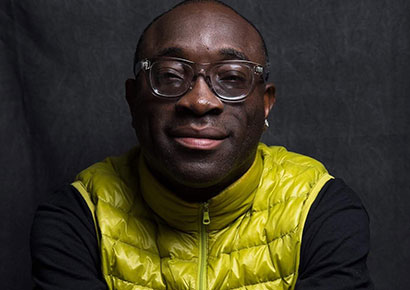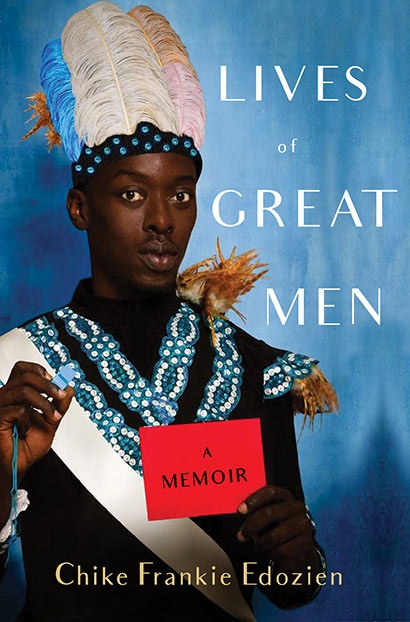Honouring queer African lives: Chike Frankie Edozien

Chike Frankie Edozien (Pic: David Campbell Morrison)
Nigerian journalist and academic, Professor Chike Frankie Edozien’s powerful new book Lives of Great Men explores coming out and LGBTQ+ visibility and diversity in a society still reluctant to accept us.
From Victoria Island, Lagos to Brooklyn, USA to Accra, Ghana to Paris, France; from across the Diaspora to the heart of the African continent, in this memoir Edozien offers a highly personal series of contemporary snapshots of same gender loving Africans; unsung great men living their lives and finding joy in the face of great adversity.
MambaOnline spoke with the now US-based author to find out more about his book and how broader African society can reach a point of truly embracing the LGBTQ+ community.
What can readers expect from Lives of Great Men?
They can expect a celebration of all of us Africans, queer and non-queer. Yes, we talk about tough times but really Lives of Great Men at its core is about all our families our friends, our supporters and our detractors. It is a window into the fantastic lives of contemporary African men and women who despite today’s obstacles still rise and are joyful.
What do you hope to accomplish with the book?
Lives of Great Men was written to highlight that we are not a monolith and remind folks that our diversity has always been our strength. All the narratives in the book are of people firmly rooted on the African continent with multi-dimensional and very full lives. And for many families, their loved ones aren’t a statistic. They are flesh and blood that they embrace even when they don’t always understand or even agree with how their loved ones live their lives. But in telling these stories, one hopes that a healthy dialogue occurs within families. We must ask ourselves, ‘is it worth it to force people into marriages that they have no intention to be in?’ What are the implications of driving people to remain closeted publicly while seeking love in a clandestine fashion outside the home? Conversations that help to change mindsets in the community will ultimately, I believe lead to successful advocacy and decriminalisation. Once that happens, we will make our way back to a society that values all its children.
Are you not concerned about the implications the book could have on you or your family back home?
There is this belief that everyone in Nigeria is a raging homophobe. That is simply not the case. But in recent times the voices of the intolerant have grown louder and louder and sucked out all the air with their rabid arguments that cloak their bigotry under the guise of religious fidelity. I have no fear of any implications. I’ve been a journalist for over twenty years and I’m used to holding up the mirror to society even when the reflection isn’t pretty. My family is clear on their position on homophobia so my writing a book that highlights our national collective flaws isn’t a surprise to them.
To what extent do you outline the state of LGBTQ+ discrimination in Nigeria in the book?
Lives highlights the joys and successes of many families, varied men and women of all social classes who despite the odds carry on and have a full life. But it’s not all fun and games so we do examine what happens when people are forced to marry, when people are attacked violently and few come to their rescue; and most importantly I think is the scapegoating of gays by their officials who often use them to cover up their lack of achievements. We are at a crisis when sons and daughters of Africa who are highly skilled, well-educated and poised to be nation builders leave the continent and go and build up European or Asian countries. All because they don’t want to deal with government sanctioned homophobia. This is a travesty that cannot go on. There is no place on the African continent where Africans should not be welcomed and feel at home.
How would you encourage or advise fellow LGBTQ+ Africans who live in fear of coming out to celebrate their gender identities and sexual orientations?
Visibility is important and not everyone is able to come out publicly. But I think it helps if everyone can find someone who is close to them that they can be themselves with. Hearts and minds are changed when the person in question is someone they care about and love. And slowly I know that communities can embrace their own. There are no easy answers but visibility is essential if LGBTQ+ people are supposed to achieve full equality. We must be seen.
Do you think we will ever get to the point of full acceptance of LGBTQ+ people considering that we are ourselves still learning about new genders and sexual orientations that are part of the community?
I believe that even more acceptance will be achieved not just on our continent, but worldwide. India is a great example of a country coming to terms with the diversity in her history and her current criminal code. Life began here on this continent and I believe there are no ‘new’ genders or sexual orientations. We’ve had LGBTQ+ folks in our history forever and as I explain in Lives there have never really been many social proscriptions against them. That part is recent. We need to get back to a ‘live and let live’ culture.
What would you suggest that we explore or avoid doing to shift the narrative and outlook on queerphobia?
Engagement is always helpful. Nuanced engagement so we aren’t just talking over each other. We’ve got to listen, debunk and find ways to not let our anger drive us away from our motherlands. At the same time, we cannot waste too much time on those who mean us harm and destruction and aren’t open to listening to us. We could simply excise them from our lives for our own sanity.
 Countries like South Africa are said to be “safe havens” for LGBTQ+ people in Africa, at least in terms of the laws we have. Should members of the community who are living in that “privilege” be taking initiatives to help those who are still subjected to the realities of homo / queerphobia?
Countries like South Africa are said to be “safe havens” for LGBTQ+ people in Africa, at least in terms of the laws we have. Should members of the community who are living in that “privilege” be taking initiatives to help those who are still subjected to the realities of homo / queerphobia?
I am pleased and so very happy that the South African Constitution guarantees equality. While I love my time in SA and consider it a second home, I’ve never looked at the country as a ‘haven’. I believe that even though this great nation has legal protections for our families there is still much homophobia in many of our communities. I can’t stop telling anyone I know to go see a movie called Inxeba (The Wound). There is a tender love story at its heart and I love this film and not just because it deals with complications of living in a society where culture dictates your every move, themes I explored in Lives of Great Men, but because it depicts wonderfully complex African men on screen. This glorious and yes controversial movie of circumcision, homosexual love in heterosexual, hyper masculine situations is simply a gem. Everyone needs to see it to gain a better understanding of complex lives and engage more in our similarities and our shared humanity.
I don’t believe that LGBTQ+ South Africans are all living in privilege. It’s a struggle but at least they are not automatic criminals. We are all in this together and we will get to the point of decriminalisation across the continent. But we must also engage in destroying the myths about us in our homesteads, villages, towns and among our broader families.
Lives of Great Men is available in South Africa for about R260.
- Facebook Messenger
- Total107
Leave a Reply